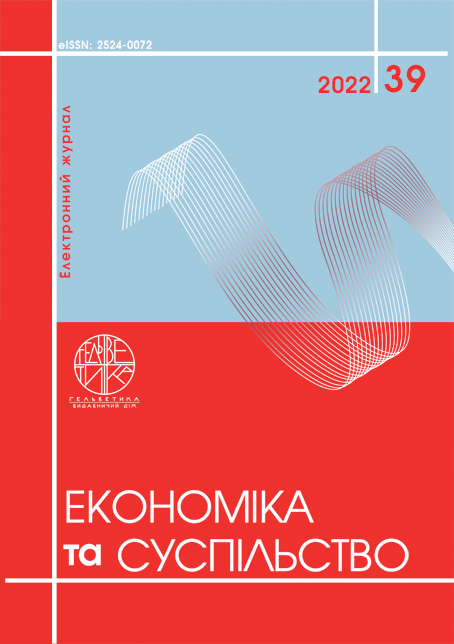PECULIARITIES OF REFLECTION IN ACCOUNTING THE PROVISION OF CHARITY ASSISTANCE FOR THE NEEDS OF THE ARMY
Abstract
The article presents the problematic aspects of accounting for charitable assistance provided by economic entities for the needs of the army and substantiates the relevance of solving this methodological issue. Charity is constantly at the center of discussions between the public and state regulators, as it is becoming more widespread. At present, the accounting of charitable assistance for the needs of the army is a very important issue. Businesses during the war have a significant impact on peace. Continuation of economic activity, payment of taxes and income are a manifestation of support for the country during the war. In addition, it is important to provide charitable assistance to the army. Keeping records of charitable assistance for the needs of the army depends on the type of assistance. It can be in the form of cash, fixed assets, goods, food, as well as in the form of wages. The materials of the article state that the easiest way to help the army is to help with money, which does not require a lot of effort and time to draw up documents, and does not affect VAT accounting. After conducting a study of the reflection in the accounting of charitable assistance for the needs of the army, it was concluded that such assistance has its own characteristics and needs more detailed consideration, because at present it is relevant and little studied. Prospects for further research are in-depth consideration of the transfer of fixed assets for the needs of the army and the features of the taxation of charitable assistance. In particular, this article analyzes the transfer of fixed assets on the example of vehicles, considers the features of the seizure of a vehicle for temporary use and alienate with full reimbursement of its value. In addition, the reflection of VAT on tangible assets of fixed assets or other non-current assets, as well as goods and services provided is analyzed. The need to improve the method of reflecting VAT and charging income tax on charitable assistance, as well as a clearer regulation of the provisions of the accounting of charitable assistance in the tax expenditures to reduce income tax. In addition, the article examines the features of the transfer of wages to the needs of the army.
References
Жиглей І.В. Розвиток обліку, аналізу і аудиту суб'єктів суспільного інтересу : монографія / за заг. ред. [із передм.] І.В. Жиглей. Житомир : ЖДТУ, 2017. 340 с.
Сисюк С.В. Організаційні аспекти обліку благодійної допомоги у бюджетних установах. Вісник Львівської комерційної академії. 2014. № 44. С. 51–55.
Маніна О.В. Особливості проведення експертних досліджень із питань державних підприємств на благодійну допомогу. Юридичний науковий електронний журнал. 2019. № 6. С. 154–157.
Матвієнко В.П., Сивак О.Б. Оподаткування благодійної допомоги: дискусійні питання. Міжнародний збірник наукових праць. 2015. № 1. С. 264–280.
Проскура К.П. Аналіз особливостей оподаткування та обліку операцій підприємств, пов’язаних з проведенням АТО. URL: http://emcon-audit.com.ua/files/articles/Proskura_ATO.pdf (дата звернення: 13.06.2022).
Про благодійну діяльність та благодійні організації: Закон України від 05.07.2012 р. № 5073-VI / Верховна Рада України. URL: https://zakon.rada.gov.ua/laws/show/5073-17#Text (дата звернення: 13.06.2022).
Про мобілізаційну підготовку та мобілізацію: Закон України від 21.10.1993 р. № 3543-XII / Верховна Рада України. URL: https://zakon.rada.gov.ua/laws/show/3543-12#Text (дата звернення: 13.06.2022).
Податковий кодекс України: Закон України від 02.12.2010 р. № 2755-VI. / Верховна Рада України. Відомості Верховної Ради України 2011, № 13-14, № 15-16, № 17, ст.112.
Zhyhley I.V. (2017) Rozvytok obliku, analizu i audytu sub'yektiv suspil'noho interesu: monohrafiya [Development of accounting, analysis and audit of public interest entities]. Zhytomyr: ZhDTU. (in Ukrainian)
Sysiuk S.V. (2014) Orhanizatsiini aspekty obliku blahodiinoi dopomohy u biudzhetnykh ustanovakh [Organizational aspects of accounting for charitable assistance in budgetary institutions]. Visnyk Lvivskoi komertsiinoi akademii – Bulletin of the Lviv Commercial Academy. № 44, pp. 51–55. (in Ukrainian)
Manina O.V. (2019) Osoblyvosti provedennia ekspertnykh doslidzhen iz pytan derzhavnykh pidpryiemstv na blahodiinu dopomohu [Features of conducting expert research on state-owned enterprises for charitable assistance]. Yurydychnyi naukovyi elektronnyi zhurnal – Legal scientific electronic journal. № 6, pp. 154–157. (in Ukrainian)
Matviienko V.P., Syvak O.B. (2015) Opodatkuvannia blahodiinoi dopomohy: dyskusiini pytannia [Taxation of charitable assistance: debatable issues]. Mizhnarodnyi zbirnyk naukovykh prats – International collection of scientific works. № 1, pp. 264–280. (in Ukrainian)
Proskura K.P. Analiz osoblyvostei opodatkuvannia ta obliku operatsii pidpryiemstv, poviazanykh z provedenniam ATO [Analysis of the peculiarities of taxation and accounting of operations of enterprises related to the ATO]. Retrieved from: http://emcon-audit.com.ua/files/articles/Proskura_ATO.pdf. (in Ukrainian)
Pro blahodiinu diialnist ta blahodiini orhanizatsii: Zakon Ukrainy № 5073-VI (2012) [About charitable activity and charitable organizations]. Retrieved from: https://zakon.rada.gov.ua/laws/show/5073-17#Text (in Ukrainian)
Pro mobilizatsiinu pidhotovku ta mobilizatsiiu: Zakon Ukrainy № 3543-XII (1993) [About mobilization training and mobilization]. Retrieved from: https://zakon.rada.gov.ua/laws/show/3543-12#Text (in Ukrainian)
Podatkovyi kodeks Ukrainy: Zakon Ukrainy № 2755-VI (2010) [Tax Code of Ukraine]. Retrieved from: https://zakon.rada.gov.ua/laws/show/2755-17 (in Ukrainian)


